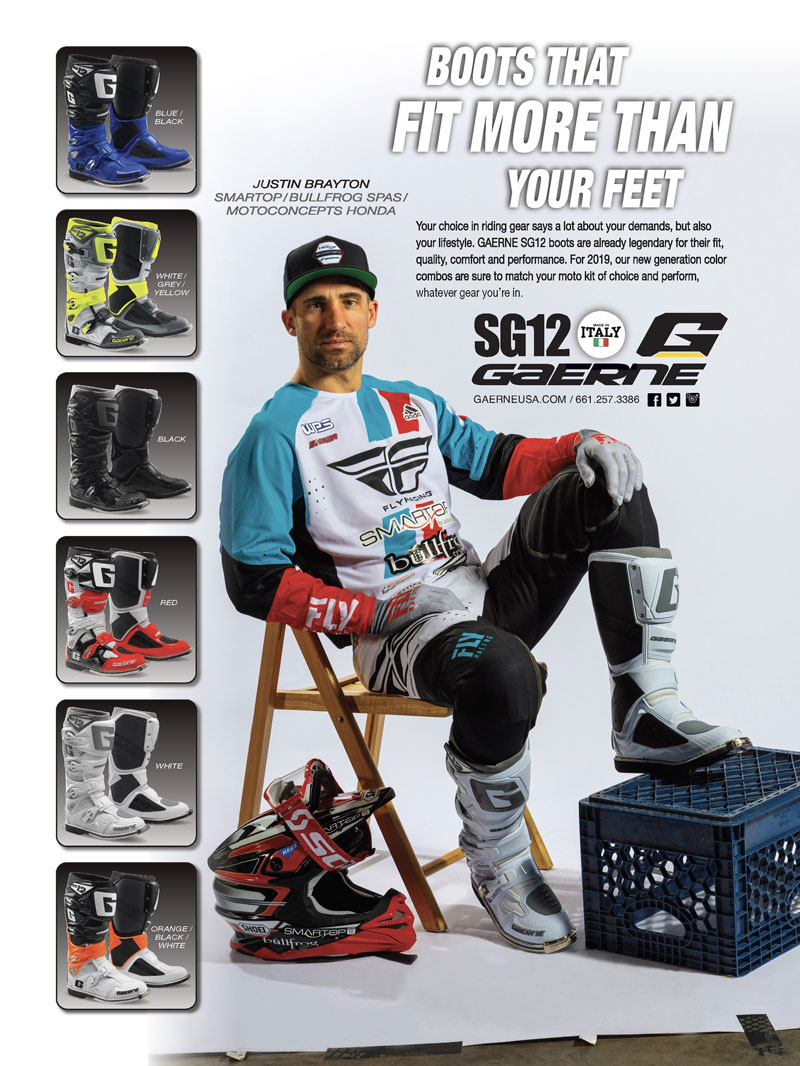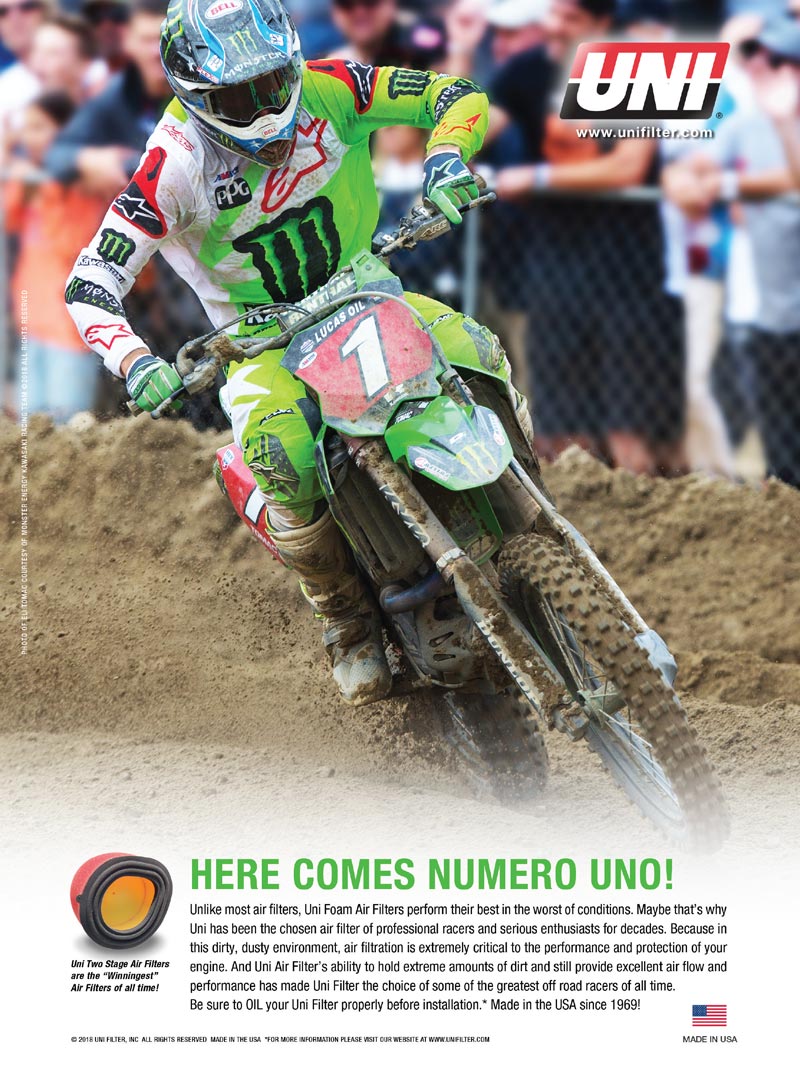
PHOTOS: RICH SHEPHERD
& JEFF KARDAS
The old Cooper Webb wouldn’t have been so humble, his shocking 2019 career turnaround providing ample trash-talk material against doubters and rivals. He’s a changed man, though.
“I got a talk from everybody when I first got here,” he says.
They’ve told him a lot.
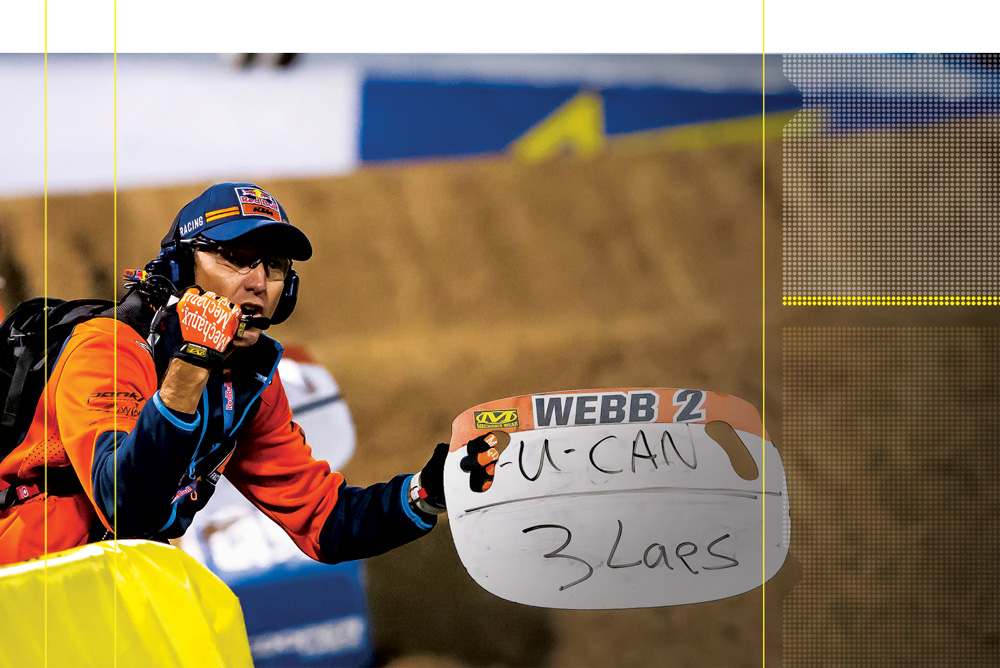

PHOTOS: RICH SHEPHERD
& JEFF KARDAS
The old Cooper Webb wouldn’t have been so humble, his shocking 2019 career turnaround providing ample trash-talk material against doubters and rivals. He’s a changed man, though.
“I got a talk from everybody when I first got here,” he says.
They’ve told him a lot.



ooper Webb’s days in the 250 class were elevated to performance art: after watching him win, you’d stick around to hear what he said about his rivals. Trash talk is pretty rare around this sport, but Webb slapped convention, as well as his competition, in the face. That attitude was a product of several factors, Cooper citing his rugged Southern sensibilities, as well as the maturity (or immaturity) levels of the junior class in general.
It probably goes deeper, though. In his amateur days, Webb was good, but the spotlight always shined brighter on his nemesis, Adam Cianciarulo. Some believe slights left a permanent chip on his shoulder. Webb, as outspoken as he is, has never broached the subject, but his swagger has always suggested that he knows, when the big-time comes, he will be ready.
“I wouldn’t say chip on the shoulder, but pressure had no effect on him,” says Tim Shutt, who helped build Webb’s old amateur bikes for Joe Gibbs Racing. “Whatever he had to do, he’d get it done.”
Adding some angst, Webb struggled to find a home as a professional. He was backed by Red Bull, which didn’t have a natural pro pipeline for its junior riders. Teams and brands like KTM and GEICO Honda had some interest, but neither was willing to move heaven and earth for his services. Meanwhile, rivals like Cianciarulo enjoyed an easy pathway from Team Green to Monster Energy/Pro Circuit Kawasaki.
Interest came from an underdog team in Bobby Regan’s Star Racing Yamaha. In the Southern rebel Webb, Regan, a former college football player from Mississippi, found the mentality he liked. Regan’s tough-love tactics ruffled some—Webb’s former teammate Jeremy Martin always felt Star was more Webb’s team than his—but jelled with Cooper.
“When I was there, Bobby really wanted to win, and he would talk crap to us and get us fired up,” Webb says. “It worked for me at that time.”
To the surprise of many, Cooper’s two 450 seasons with the revamped Monster Energy Yamaha team failed, putting the Blu Cru’s blue-chip talent on the free agent market—and at a reduced price, even. Further, Red Bull KTM had a gaping hole because Broc Tickle failed an anti-doping test, resulting in suspension and termination. Had KTM signed Justin Barcia instead of Tickle (which nearly happened) they would probably still have him now, and Webb would still be on a YZ450F. The Yamaha team did want him back again for 2019, but Webb was ready for change.
“I think for me, regardless, even if [Yamaha] would have thrown the moon at me, I had my mind made up of where I wanted to be,” Webb says. “For me, there were no hard feelings. It’s business. I get where they’re coming from. They invested a lot and didn’t get much in return, so I see where they’re coming from.”

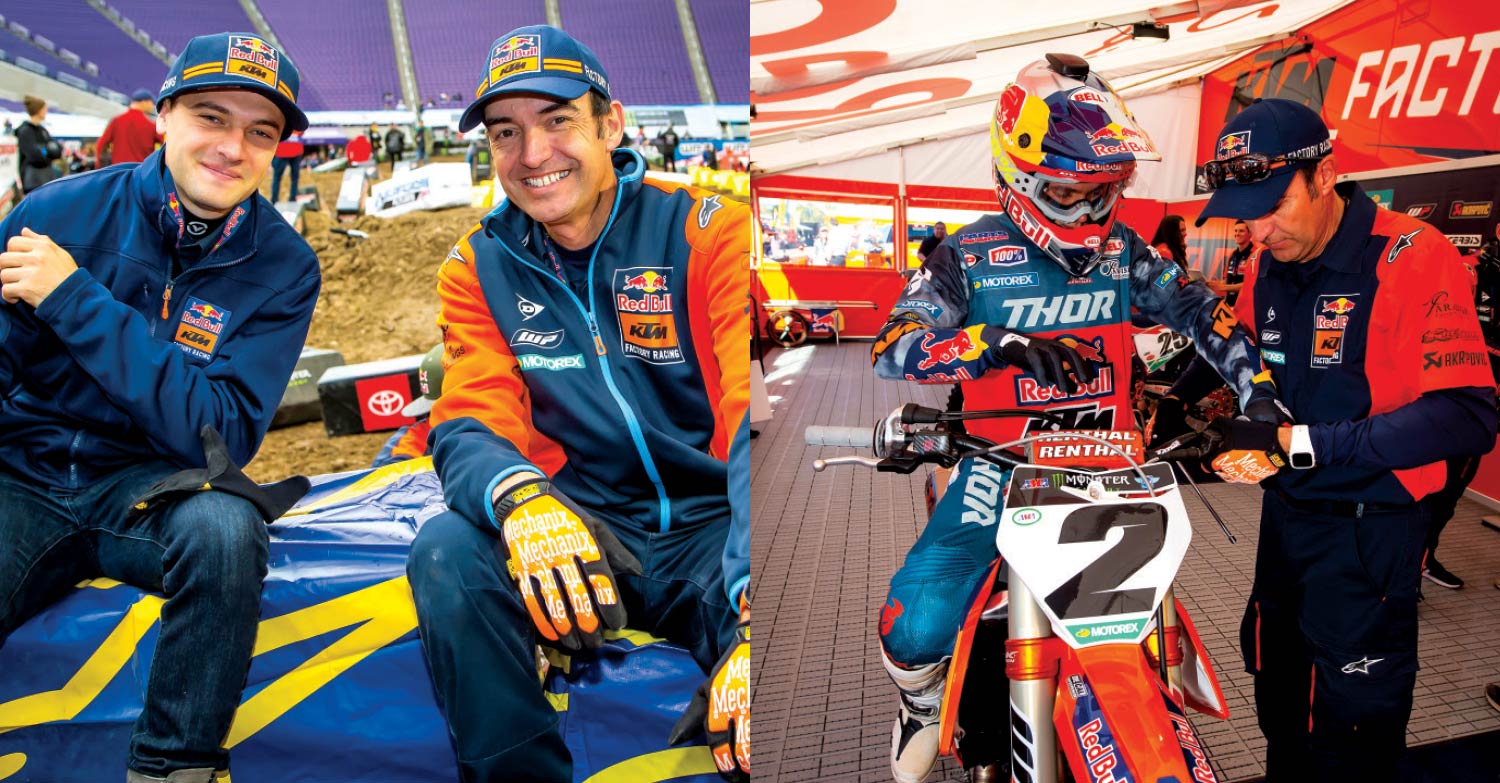

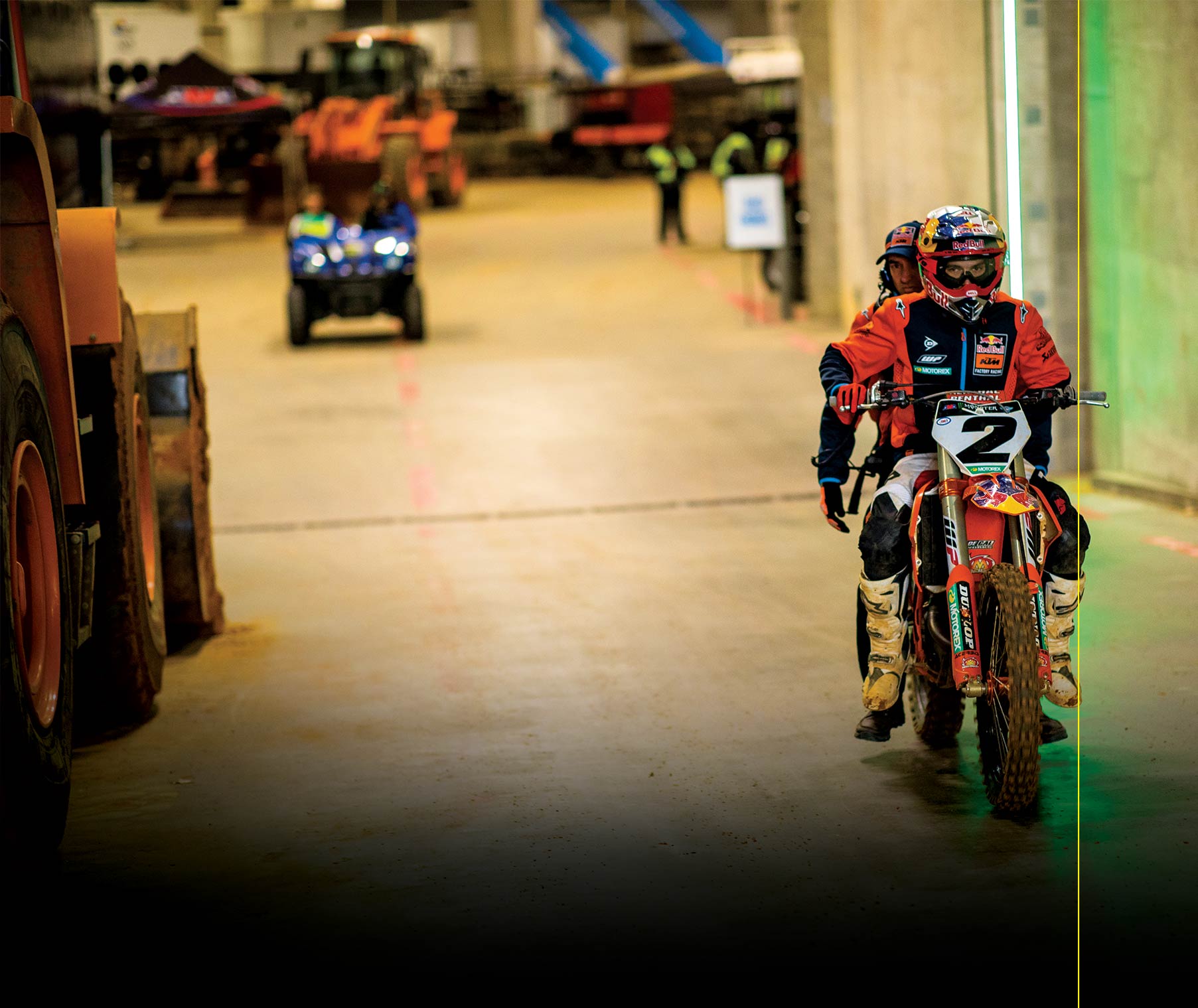
To the surprise of many, Cooper’s two 450 seasons with the revamped Monster Energy Yamaha team failed, putting the Blu Cru’s blue-chip talent on the free agent market—and at a reduced price, even. Further, Red Bull KTM had a gaping hole because Broc Tickle failed an anti-doping test, resulting in suspension and termination. Had KTM signed Justin Barcia instead of Tickle (which nearly happened) they would probably still have him now, and Webb would still be on a YZ450F. The Yamaha team did want him back again for 2019, but Webb was ready for change.
“I think for me, regardless, even if [Yamaha] would have thrown the moon at me, I had my mind made up of where I wanted to be,” Webb says. “For me, there were no hard feelings. It’s business. I get where they’re coming from. They invested a lot and didn’t get much in return, so I see where they’re coming from.”




“When you were with Yamaha, you had 24 starts and two podiums,” began longtime supercross stat man Ben Bridges. “With KTM you have seven starts and four wins. What in the world is going on?”
“I think you just answered your own question,” Webb said with a smile.
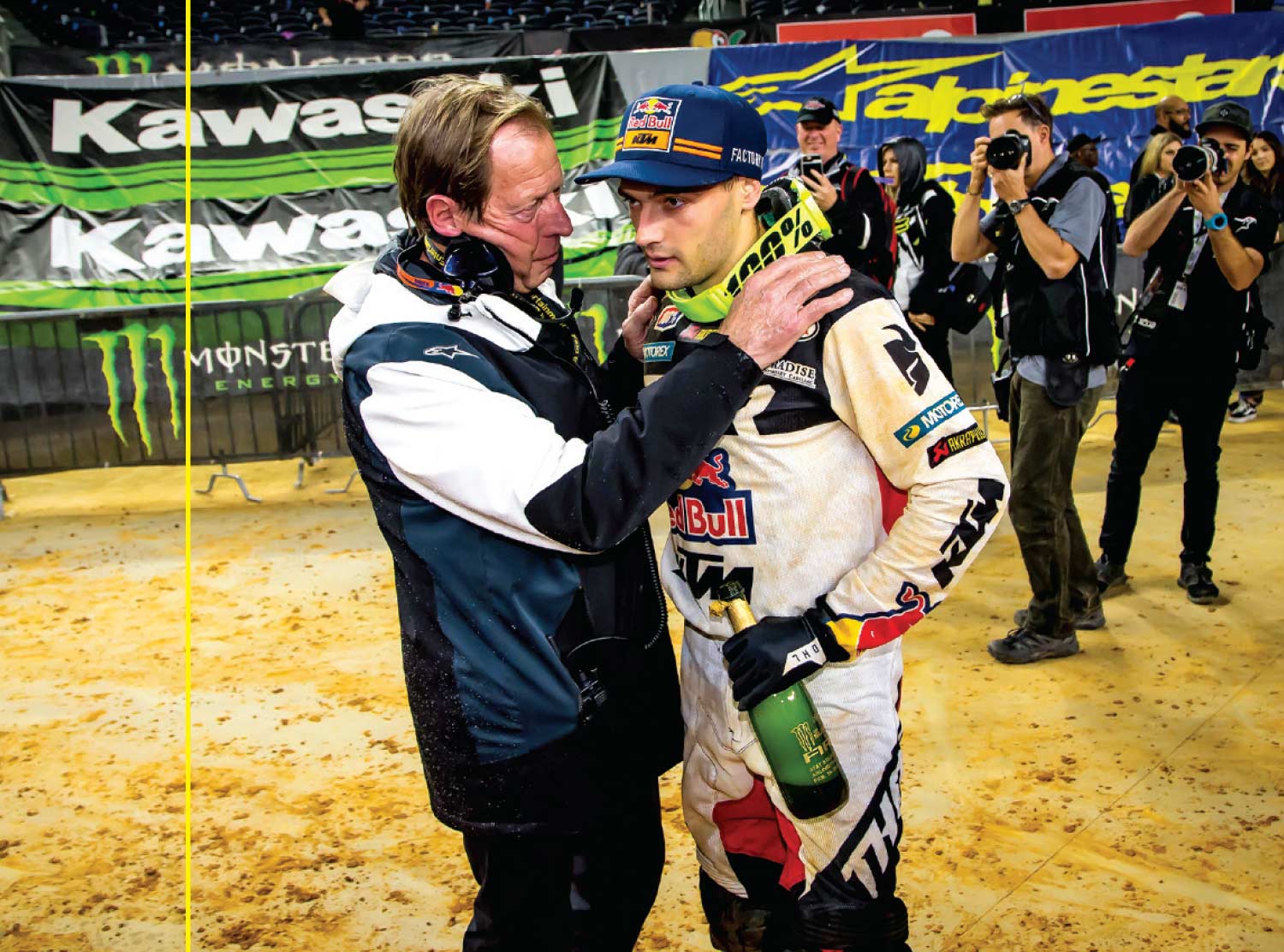


Moving to KTM unlocked new mentors, like the Roger DeCoster/Ian Harrison management duo, trainer Aldon Baker, mechanic Carlos Rivera, and even Ryan Dungey.
“I feel like I’ve always been very open-minded, but I feel like it’s hard—and I hate to say it—to trust certain people,” he says. “I’ll listen to all of it, but you don’t always use the information. When I came [to KTM] I was open-minded like I always have been, but the information now is coming from Roger, who is established, and it’s coming from Carlos, Aldon, Dungey. . . . Obviously, you’re going to listen to everything they have to say.”
Rivera, the wrench, plays a big role—not just with bike setup or technical details, but even analyzing riding technique to improve his starts.
“He’s very, very involved,” Webb says. “To have a younger guy, I think he likes that there’s a lot that he can teach me. Between my starts, my whole posture and technique, the testing and riding—he’s so good at seeing the bike and how it reacts, and even my mentality. I’ve had great mechanics and great relationships before, but Carlos is not scared to tell me how it is, whether I’m not acting the right way or bike technique or anything. But really, it’s the starts. I would attribute a lot to him.”
When Cooper isn’t in California to work with Rivera in person, his practice mechanic has to send videos of each day’s starts so Carlos can inspect them. Baker, the trainer, says if each day’s LitPro lap time data doesn’t get logged, Rivera will instantly call and ask for it. The former wrench for Davi Millsaps and Ryan Dungey is heavily invested in his new project.
“He was a young guy with a lot of potential, but maybe he was beat down a little bit,” Rivera says. “I like that—I’d rather take a guy like that than someone who is already at the top.”
Rivera got his wish when Webb first showed up to test a few days before his orange debut at the Monster Energy Cup. Webb was off the pace, but Rivera saw that as a positive—there was room for improvement. Soon came the emphasis on starts, long one of Webb’s weaknesses, and then training and intensity work with Baker.
That’s just the physical stuff. The new group also focused on harnessing Webb’s emotions. It’s one of the main reasons DeCoster wanted Webb paired with a veteran mechanic.
“We want the rider to spend his energy riding the track as good as he can and not on things that don’t have anything to do with racing,” DeCoster says. “The guys race in a close environment. Sometimes you touch each other and it’s not always intentional. But if you get guys with the same character, they get fired up. And it’s okay to get fired up—we don’t want him to lose that—but you have to use it the right way. We need someone who can keep him calm.”
“I worked for Davi Millsaps and Ryan Dungey, and they were not known for being aggressive with other riders,” Rivera says. “When you start playing these games, you start slowing each other down, and I’ve learned that it never ends well. It just continues; the guys just battle like that all year, and it just keeps going. The best thing to do is pass him clean and not get into any of that. For instance, I was proud of Coop in Minneapolis. He had a lot of pressure from behind with Ken Roczen and was trying to make lines and pass [Joey] Savatgy. He could have gone in there like old Coop and plowed the guy over the berm, but he actually calmed himself down, found the lines, and then those guys started making mistakes.”


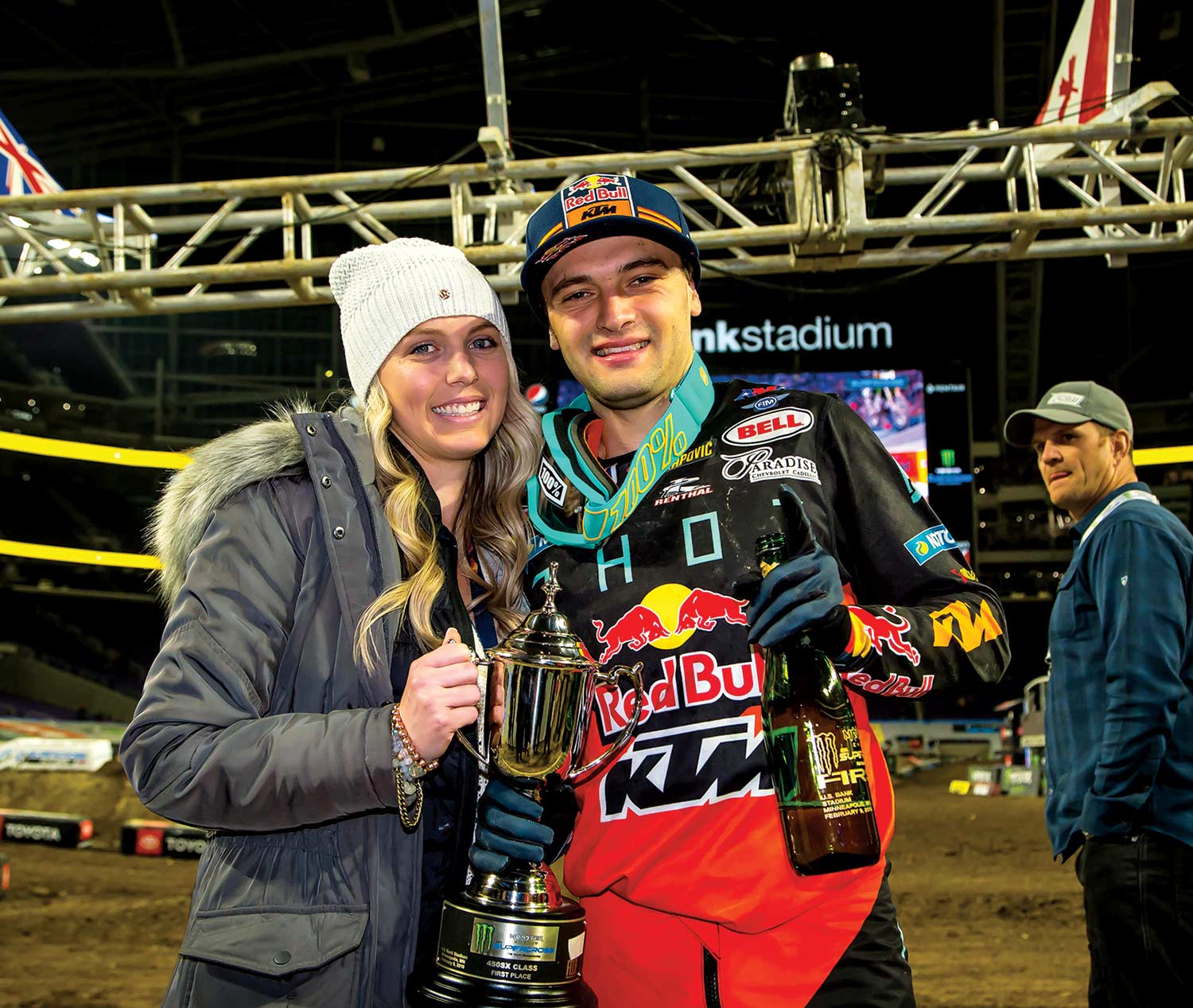
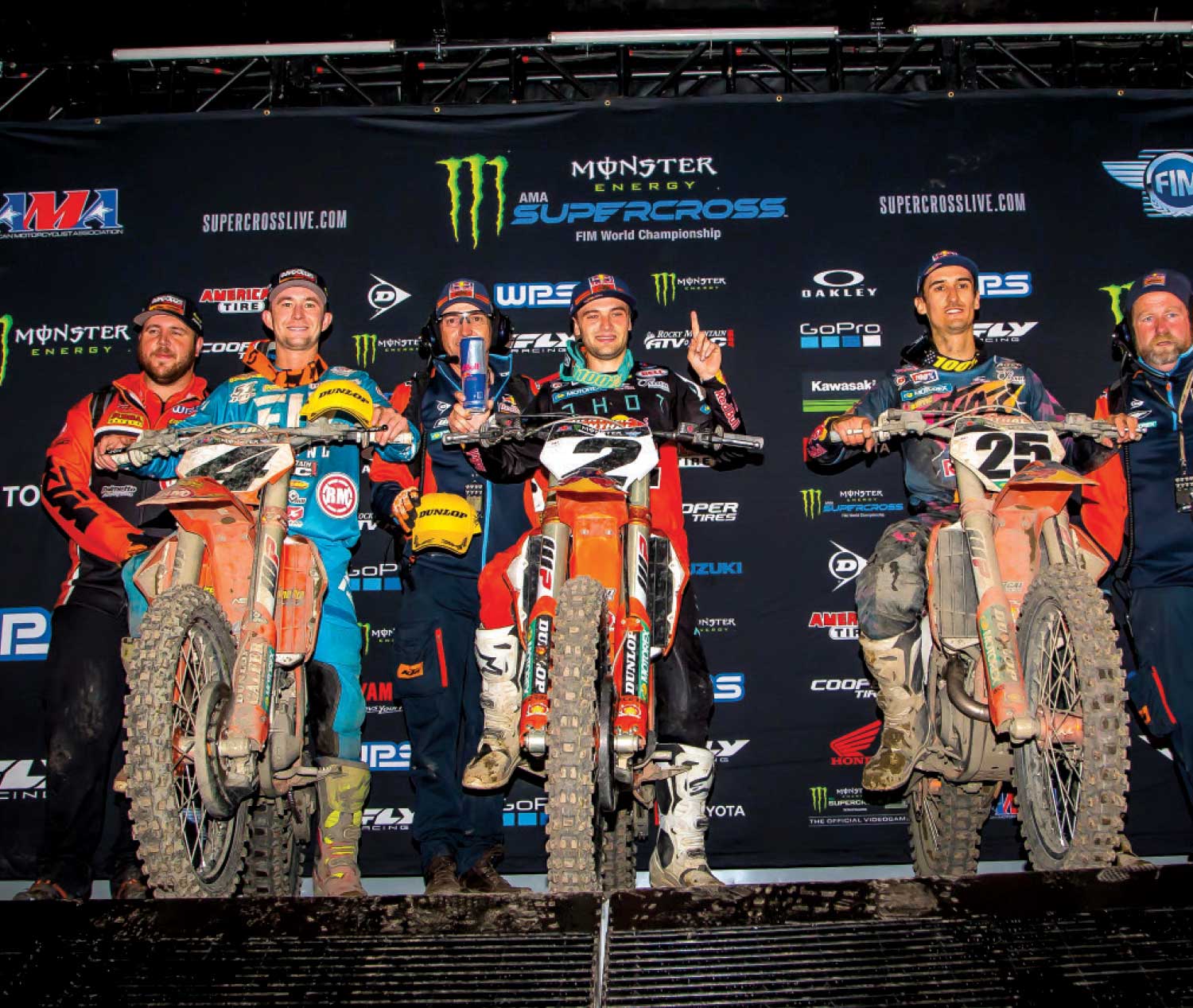
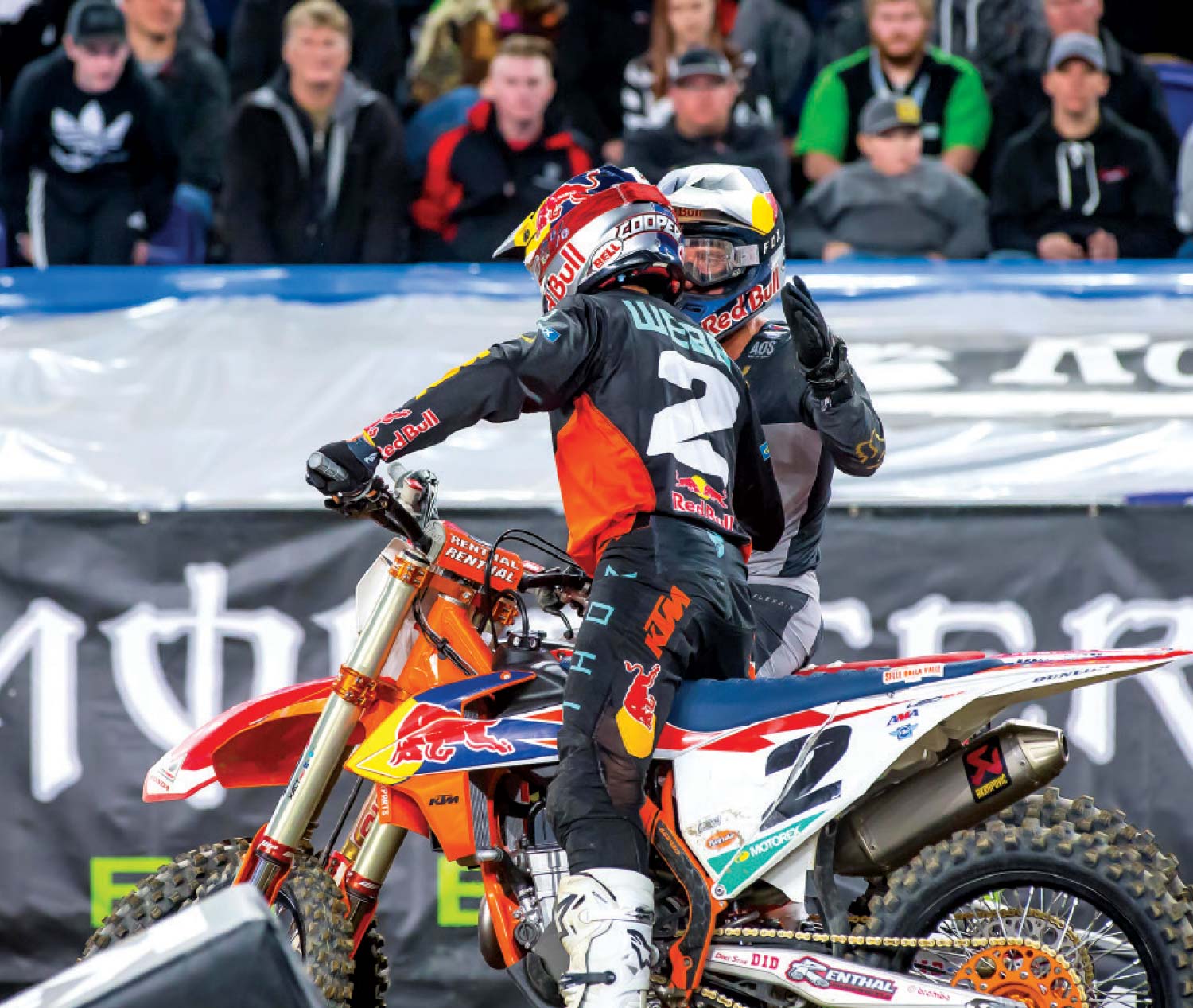
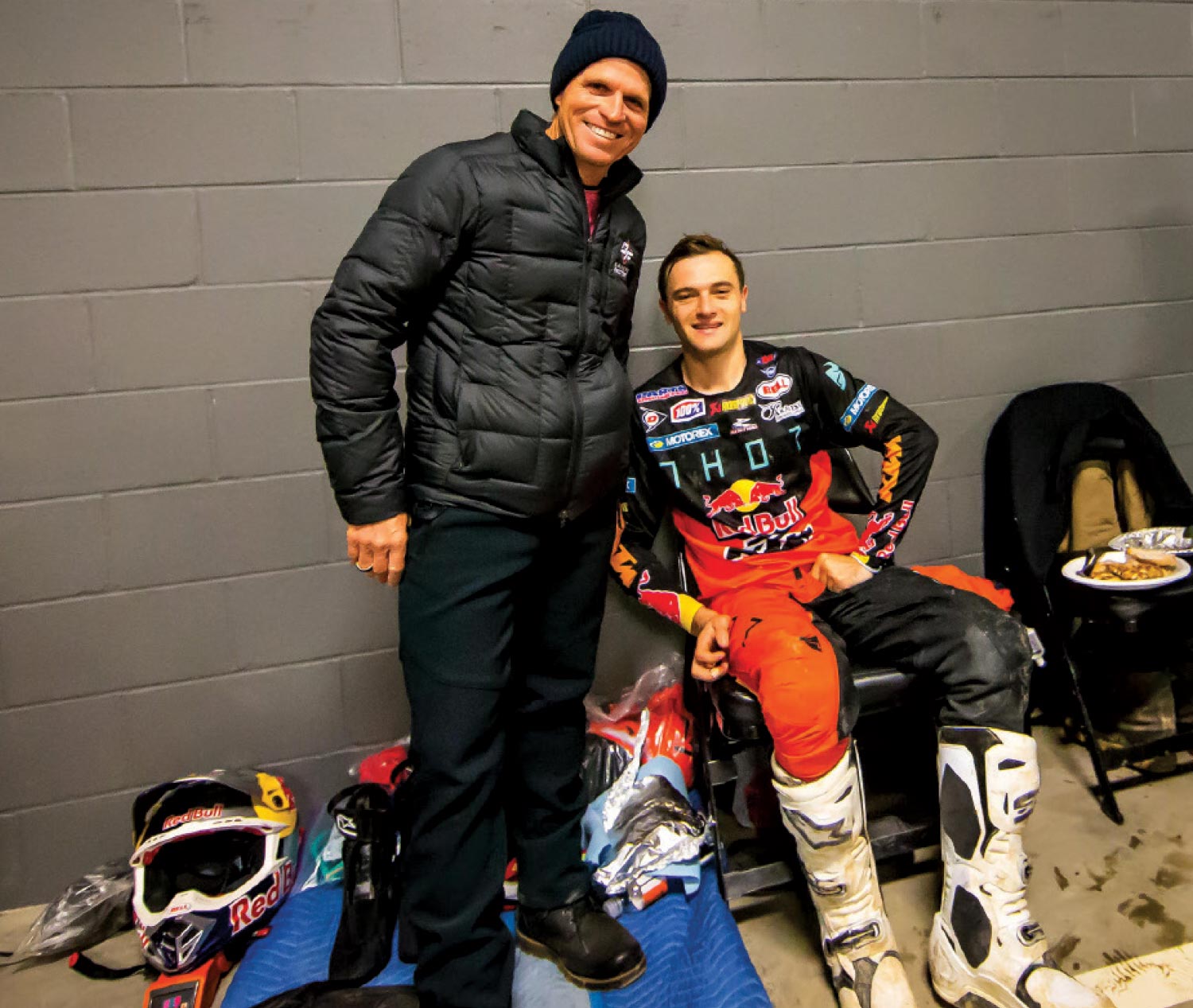




“It was a big risk, I think for mainly Aldon, because I don’t think I really knew him,” Webb says. “And obviously, from the outside looking in, he probably thought I was a shithead. Didn’t want to train with them, but I am being forced to because KTM is making me, and who knows where my head is at. Is the kid lazy? There were big adjustments. When I got there, I’m going to be honest, I was not as fit as I think obviously he thought or even myself. That was a big adjustment for sure.”
Webb was told to sit down and stay humble, because Baker’s program requires elite riders to work together. Baker always preaches respect above everything else with his athletes. Well, two down years on the 450 did all the required humbling, and that’s why Webb still won’t puff his chest out.
“With Coop coming on board, it’s something I think the rest of the guys were not like, ‘That’s so awesome, we can’t wait,’” Baker admits. “They knew he’s a guy that has ability and, put in the right environment, could also be a threat to them. But in the bigger picture, they also see that no matter what, we’re going to race the guy on the weekend anyway, whether he was on our team or not.”
In a far cry from the bravado of his past, Webb told his new riding partners he wasn’t at their level yet.
“I got a talk from everybody when I first got here,” Webb says. “From Aldon, from Roger, from Carlos, everybody. And that helps, and also some of it comes from age. It’s a good balance, learning to control when to use it. I think they’re realizing that, hey, when this guy gets upset, he doesn’t fold—he can actually ride better. But I think they’ve channeled the when and the where, and that’s helped me keep my emotions in check and grow into a better person and a better racer.”
Another humbling experience?
“When I first got there, I was getting absolutely smoked,” Webb says. “[Aldon] could not believe it and was like, ‘Dude, what are you doing? You’re three seconds a lap off on our freaking supercross track.’ I just told them, ‘Don’t worry. Once I get to the race, I’ll be good.’ He was like, ‘No, that is not the way it’s going to be. You need to practice hard and race hard.’ That was a big adjustment, even for myself.”
Baker credits Webb for hanging in there during the tough days—and there were many—and Webb says things only clicked a few weeks before the season. At Anaheim, Rivera said Cooper’s laps during the week could now match anyone’s, and he was fitter than before and a better starter.
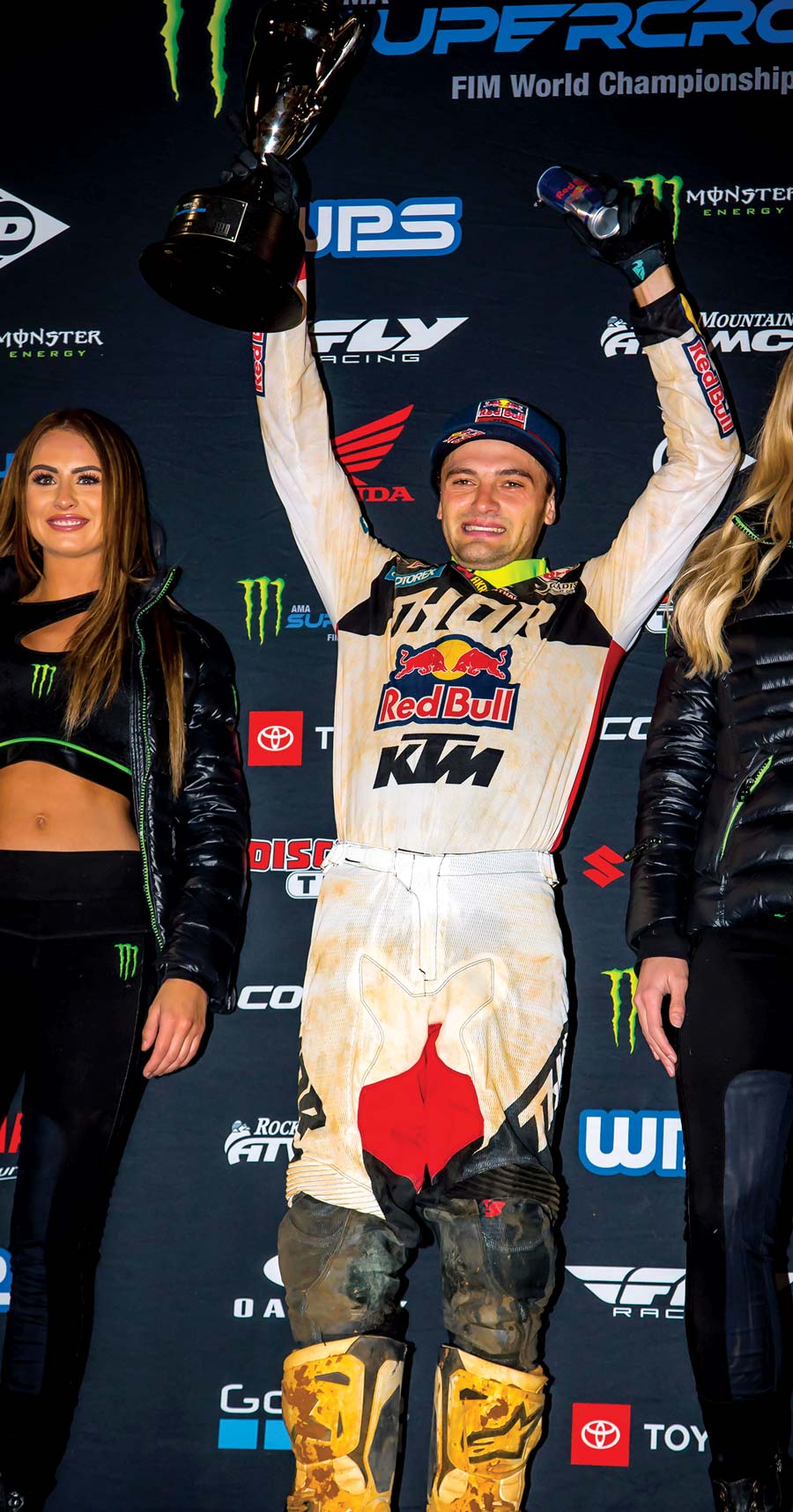
Remember that old thing about pressure? Webb passed Ken Roczen on the final lap of Anaheim 2 to steal a win. It came into focus again in Arlington, when Webb was faced with a bad start. Now his old instincts were needed, and he did as he’s always done: he learned, applied, dug deep, and executed, all in the heat of the moment.
“The bad start did kind of help me learn where I could make passes, which helped when I got up to those guys,” Webb would explain afterward.
With half a lap to go, Roczen had a gap. But Webb owned the final moments, making another pass in the final corner—a clean one, by the way—to steal the win in one of the most dramatic finishes in supercross history, a margin of .028 seconds.
This new crew has brought the best of Cooper Webb back to the racetrack, but his 2019 run is about more than motorcycles, starts, training, or emotions. That special stuff? Those are the things you really can’t teach. 




